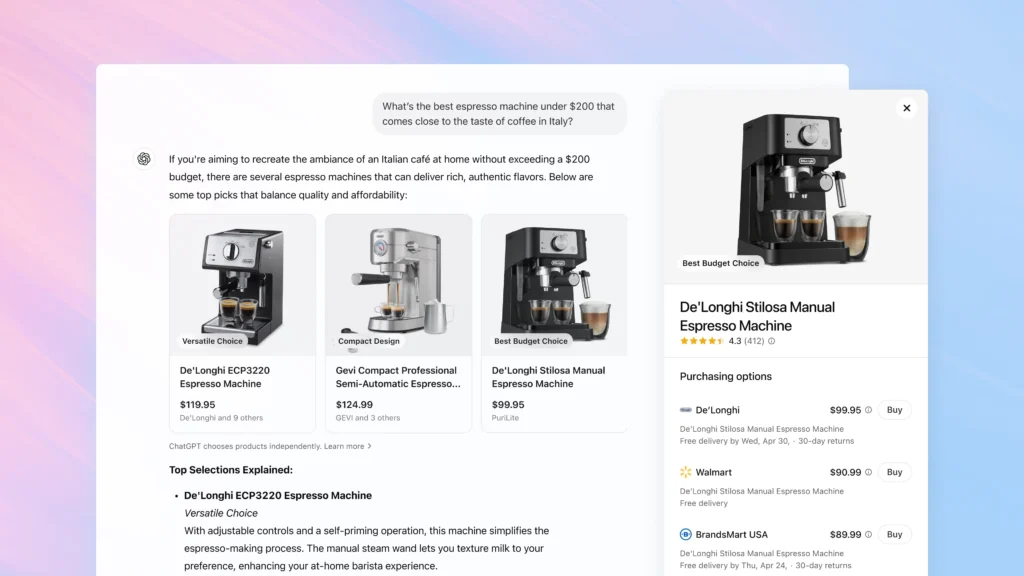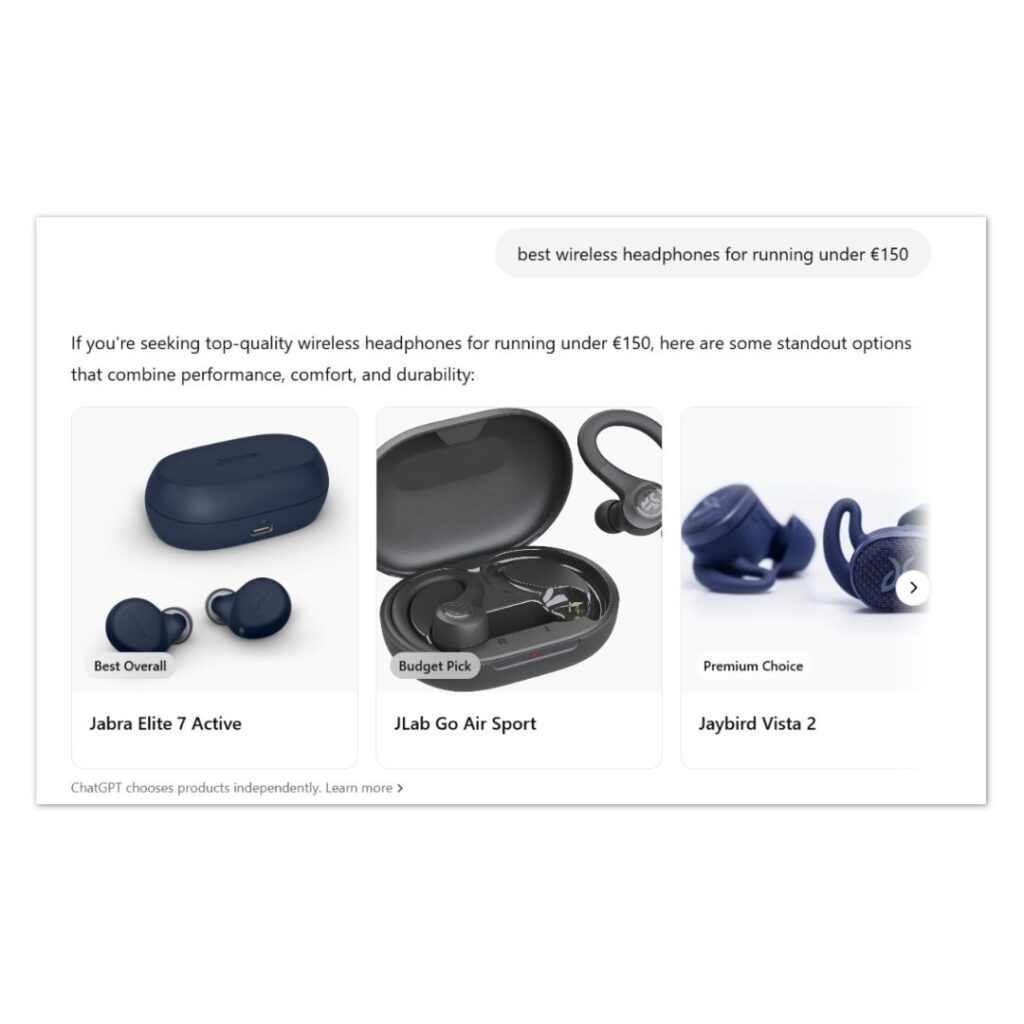Big news from OpenAI: ChatGPT Search now includes a built-in shopping feature, aimed at making product discovery faster and smarter than ever.
Launched globally on April 28, 2025, this update marks another step toward blending AI-powered conversations with online shopping.
Here’s what businesses and marketers need to know.

Product discovery inside ChatGPT
When users search for products through ChatGPT, they’ll now see curated product suggestions, complete with images, reviews, descriptions, and direct links to buy.
But it’s not just a basic listing. Thanks to ChatGPT’s natural language understanding, users can ask detailed, highly specific questions—like “best wireless headphones for running under €150”, and get relevant product recommendations immediately.
For now, the shopping experience focuses on categories like fashion, beauty, home decor, and electronics.
And importantly, OpenAI clarified they don’t earn commissions from purchases through these links.
Where Does ChatGPT’s Shopping Data Come From?
OpenAI sources product information from structured metadata across various third-party websites.
It pulls in details like price, product specs, and customer reviews to build its shopping recommendations—all while adhering to its AI safety standards.
Unlike traditional search engines that simply list websites, ChatGPT actually generates a curated shopping experience based on what the user asks.
Who Can Access the New Shopping Feature?
The new shopping functionality is rolling out worldwide and is available for:
- ChatGPT Pro, Plus, and Free users
- Non-logged-in users through the new GPT-4o model
In short: anyone using ChatGPT will soon experience AI-enhanced shopping suggestions.
Why is OpenAI adding shopping to ChatGPT?
With this move, OpenAI clearly aims to challenge Google’s dominance in product searches.
By combining natural conversation with real-time shopping data, they hope to create a more intuitive, personal, and frictionless shopping experience for users.
It’s part of a broader trend: AI is not just answering questions anymore—it’s becoming a new kind of search engine.
Personalization: Memory meets shopping (with a few limits)
Soon, ChatGPT will integrate its memory feature with shopping for Pro and Plus users.
This will allow the AI to remember past interactions and offer even more personalized product suggestions based on previous chats.
However, this personalized shopping experience won’t roll out in the EU, UK, Switzerland, Norway, Iceland, or Liechtenstein yet, due to local data privacy laws.
Is this the future of e-commerce?
Earlier experiments like OpenAI’s “Operator” platform hinted at AI shopping agents that crawl dozens of websites to suggest products.
But the new ChatGPT shopping experience is faster and more streamlined—users ask, ChatGPT answers.
No waiting for web scans. No clicking through endless search results.
It’s a major shift toward conversational commerce, and it’s happening right inside the AI tools consumers are already using.
How to make sure your products show up in ChatGPT search
If you want your products to be surfaced in ChatGPT’s shopping feature, make sure you’re set up properly:
- Allow OpenAI’s crawler: Check your
robots.txtfile to ensure you’re not blocking OAI-SearchBot. - Track referral traffic: ChatGPT traffic is visible under referral traffic, so you can track ChatGPT-driven visits in tools like Google Analytics.
- Prepare for product feeds: OpenAI plans to introduce merchant feeds soon. Signing up for updates will ensure your listings stay accurate and visible.
- Track your visibility in ChatGPT with 3rd party tools. You can connect us and we’ll set up a report for you that tracks your visibility in ChatGPT for your most important keywords on a daily basis.
Does ChatGPT Use Bing for Shopping Results?
You might have noticed that sometimes ChatGPT says it’s “searching the web” when answering questions.
In those cases, especially for general information, ChatGPT typically uses Bing Search through Microsoft’s API to find real-time data.
However, it’s important to note that ChatGPT’s new shopping feature does not simply pull Bing search results.
Instead, OpenAI uses its own product discovery system, which includes:
- Structured metadata collected by OpenAI’s own crawler (OAI-SearchBot)
- Third-party information like product descriptions, prices, and reviews
- AI-generated recommendations based on user queries
This means the shopping suggestions you see in ChatGPT Search are based on OpenAI’s independently gathered and processed data, not just a live Bing search, even if that plays its role too.
Final thoughts
Shopping directly through AI platforms like ChatGPT could reshape how consumers discover and buy products online.
As AI-driven search continues to grow, businesses that adapt early, optimizing for natural language queries and AI visibility, will have a serious advantage.
Sources: Openai.com, Adrelevance.se
At Genero Growth, we help brands stay ahead of these shifts.
Curious how you can optimize for ChatGPT Search? Get in touch—we’d love to help!
Author:


